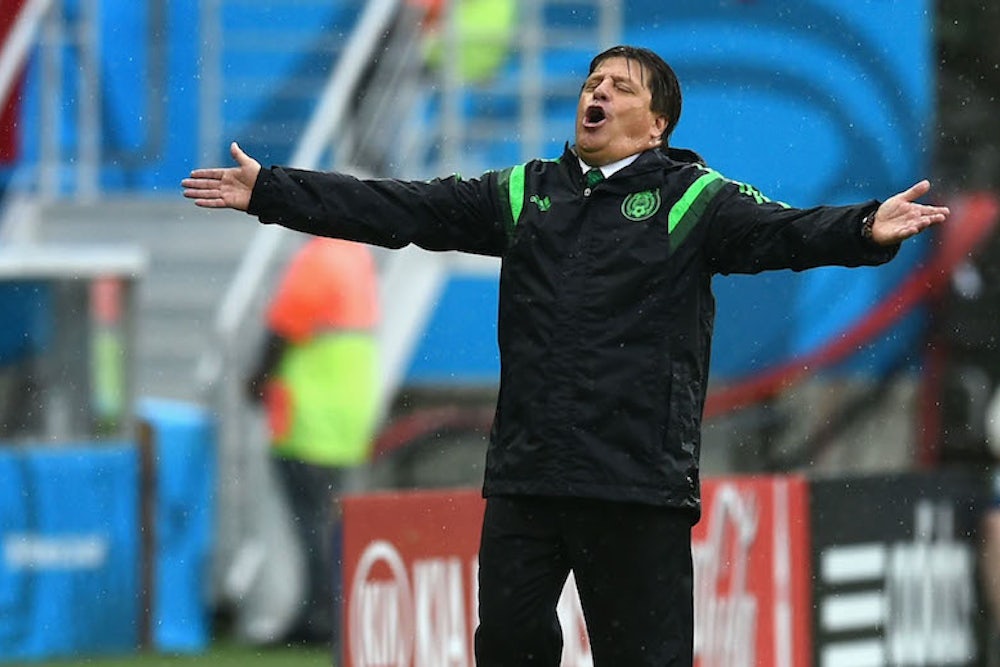Since you probably saw him losing every last bit of composure on the sidelines a couple of days ago during the Mexico-Cameroon match, let me introduce you to Miguel Herrera, nicknamed "The Louse," our histrionic coach.
I met Herrera 20 years ago, when he was one of Mexico's most talented full-backs, a locomotive running down the right flank of the national team, and I was a young journalist working on a series of profiles of the team who would represent the country in the 1994 World Cup. I had already travelled to Madrid to share a couple of beers with Luis García, a wonderfully agile striker then playing for Atlético. I had found him completely relaxed, more in awe of the directness of Spanish women than the demanding rhythm of La Liga. I had also spoken with Jorge Campos—a jester on and off the field—and Claudio Suárez, Mexico's legendary center-back, who had serenity so majestic that it earned him the well-deserved nickname of "El emperador." I had left Herrera for last because I expected him to be the most difficult. The guy had a notorious short fuse, you see. Guick to anger, puffing up like a blowfish: a red Hulk.
I found the exact opposite.
Herrera opened the door and out came his daughter, laughing and hugging his father's famous right leg. Tiny Tamara had Miguel's laugh and also, alas, his haircut: a notorious mullet that Herrera wore with palpable yet mystifying pride. We spoke for three hours, most of it about football. Then I asked the unavoidable: Why, I wanted to know, was he so damn angry on the field? His answer caught me completely off-guard. Herrera went back to his childhood. He had grown up in the same rough neighborhood he still lived in. For some unfortunate reason, his father was not present in young Miguel's life, leaving the kid (as so many in Mexico) in the care of his mother and grandmother, both of whom he idolized (and still does). Kids on the street were rough with Miguel, bullying him over the absence of his father and, not surprisingly, over his blond hair. "I had to learn to fight," he told me. He got in the habit of stepping into even the pettiest of squabbles, slowly building a legendary temper. And that, of course, is what turned him into an indefatigable footballer, running after adversaries like a man possessed. He eventually made it to Mexico's first division and, soon after, to the Mexican squad.
Unfortunately for Herrera, his anger had an unpredictable dark side: It flared up at the most inconvenient of times. One such episode became his downfall. It happened during a qualifier for the 1994 Cup, soon after our interview.
He had been entrusted with Mexico's right flank against Honduras. He was to face Dolmo Flores, a muscular winger with a nasty temper of his own. Mexico's coach Miguel Mejía Barón had warned Herrera of Flores, told him the guy would try to get into his head. And so Flores did. On a routine run, the Honduran charged against Herrera. They collided, Herrera's mullet shaking in the wind. Both players fell. When the Mexican stood up, his face had changed. He went looking for a fight, shoving his opponent. The referee sent him off. A few days after the incident, Herrera lost his spot on the team, missing out on the opportunity to play in the World Cup. Defeated by his passions, he would never get the chance again.
After retiring, Herrera decided to become a coach. For us journalists, it was an odd choice: Here was this man, utterly incapable of controlling his emotions, trying to become a chess player. It was the anatomy of a failure, we all thought. What happened was very, very different.
Whether by accident, the sheer passage of time or some actual soul-searching, Herrera learned to manage his demons while keeping his childlike capacity for excitement. He lost the mullet, gained a few pounds and became an enthusiastic coach, a fantastic motivator and, after learning from the best—Herrera was a protégé of daring coach Ricardo LaVolpe—a savvy tactician. Yes: He still yelled like a madman from the sidelines. But the anger was gone; all that was left was distilled passion. He became committed to possession football, showing a clear fondness for attacking formations. As you would expect, his teams could be reckless. But they were never dull. Last year he won a championship in dramatic fashion with Club América. Under a historic downpour on a Sunday at Azteca Stadium, Herrera ran up and down the field, screaming, pumping his fists in the air like a boxer gone bonkers.
That is the man who helms Mexico's ship in Brazil. Against Cameroon, his team played in true Herrera style: keeping the ball, opening the field wide, not giving an inch to the muscular Cameroonians. Mexico won 1-0. It should have been more, were it not for a semi-blind referee. Again, the game took place under the heaviest of rains. And yes, by the end of it, Herrera was screaming once more: his face transformed, a wonderful maniac, an expert in the art of overcoming. A happy, very wet louse.
Bring on Brazil!
